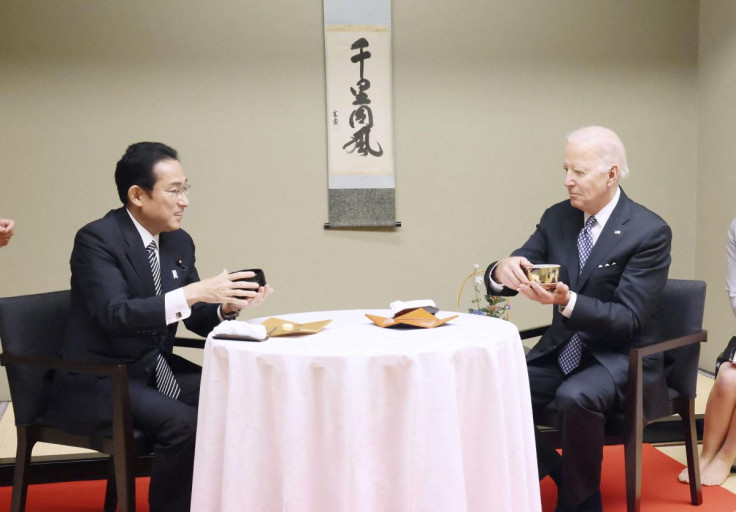Behind The Scenes In Japan, A Welcome For Biden's Defence Of Taiwan

For Japan, U.S. President Joe Biden's comment he would be willing to use force to defend Taiwan signalled no formal change in policy. But behind the scenes in Tokyo, it was seen as a welcome warning at a time of growing alarm over China.
Biden's remark on Monday - during his first Asia visit since taking office - appeared to stretch the limits of the U.S. policy of "strategic ambiguity" toward self-ruled Taiwan, to China's anger.
While the United States has a commitment under its Taiwan Relations Act "to help provide Taiwan the means to defend itself", it has long declined to make clear how it might react in the event of a Chinese attack on the island.
An aide to Biden later said his comment represented no change in the American stance toward the island, which China claims as its own.
Officially, Japan took a similar line. Chief Cabinet Secretary Hirokazu Matsuno said on Tuesday there was no change in the allies' position on Taiwan, although he declined to comment on Biden's remark.
But some senior members of the ruling Liberal Democratic Party (LDP) welcomed the comment, which was seen as dispelling doubt about whether the United States would really act in a time of crisis.
"The remark goes far beyond the ambiguous strategy of past administrations. This will contribute to peace and stability in the Taiwan straits," Masahisa Sato, a former deputy defence minister and well-known LDP hawk, said in a blog post.
"There is a lot of praise for this within the party."
Keisuke Suzuki, a former deputy foreign minister praised Biden's comment as "very important and timely" in a post on Twitter.
For Prime Minister Fumio Kishida, who stood next to Biden when he spoke, the safety of Taiwan is vital. Taiwan and Japan are part of an island chain that hems in Chinese forces. Losing Taiwan would breach that line and be seen as a threat to Japan.
"To deter China from embarking on adventurous military actions should remain the most important task," said Tomohiko Taniguchi, who was an adviser to former prime minister Shinzo Abe. Biden's comments were "welcome to Japan, Taiwan, and to the Indo-Pacific region", he said.
Countering China's growing military and economic influence in the Indo-Pacific region has been the overarching theme of Biden's visit.
The president, advisers and analysts have said, came to Asia with a clear message to China: don't try what Russia did to Ukraine anywhere in Asia, and especially not to Taiwan.
"For the United States to say it would act in an emergency is not a bad thing for us," an LDP official who works for an influential lawmaker told Reuters on condition he was not identified.
IT'S COMPLICATED
Japan has a complicated relationship with China, which is both its biggest export market and its biggest source of imports. For years, Japanese companies have built deep supply chains in China, although the Japanese government now wants them to bring some manufacturing home.
A Chinese invasion of Taiwan could also disrupt sea lanes that Japan uses to carry goods to much of the rest of the world, and to bring in the oil from the Middle East that powers the world's number three economy.
"If Taiwan was occupied, Japan could be seriously damaged because our sea lanes are near Taiwan," said retired admiral Katsutoshi Kawano, who served as chief of the Japanese Self-Defence Forces' Joint Staff for five years until 2019.
Biden's comment would help deter China from attacking Taiwan, he said.
Japan's expressed its concern about Taiwan in its latest annual defence white paper, noting a "sense of crisis" about Taiwan and the threat Chinese forces posed to it.
In the weeks since the attack on Ukraine, which Russia calls a "special operation," Kishida has also warned of increasingly fragile security in East Asia.
China has described its manoeuvres around Taiwan, which have included regular incursions by its aircraft into Taiwan's air defence zone, as normal military activity.
On Friday, Taiwan's air force scrambled planes to warn away 18 Chinese aircraft, Taiwan's defence ministry said, part of what has become a regular pattern that has angered the government in Taipei.
As Chinese planes and ships around Japan also increase in number, Japan is raising defence spending, with Kishida's party pushing for it to double to 2% of gross domestic product.
Even that, however, will not match the pace of increasing military spending by China, which is already almost five times higher. For decades Japan has limited itself to short-range weapons because its pacifist constitution bars it from waging foreign wars.
Those constraints mean Japan would likely rely on its U.S. ally to fight in Taiwan, while it hosts and supports the surge in troops, planes and ships that would be needed to defeat China.
© Copyright Thomson Reuters 2024. All rights reserved.





















